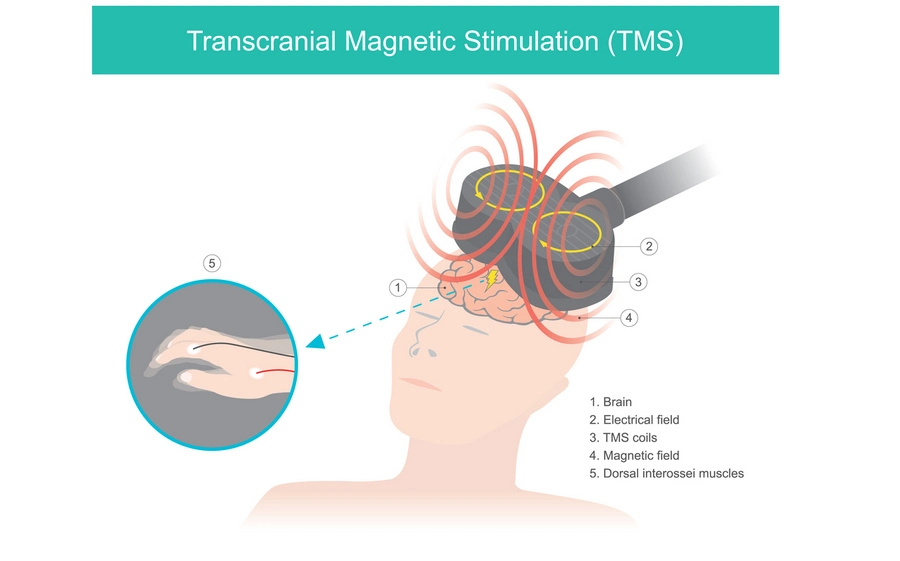- Jay Schiff
- 0 Comments
This article will address the prevalence of anxiety disorders and the challenges faced by individuals seeking effective treatment options. It will focus on the use of Transcranial Magnetic Stimulation (TMS) therapy and its effectiveness in treating anxiety disorders.
Understanding TMS Therapy
What Is Transcranial Magnetic Stimulation (TMS)?
Transcranial Magnetic Stimulation (TMS) is a proven treatment used for over 15 years. It stimulates areas of the brain in a fast and safe manner by a magnetic pulse. This procedure has been approved by the FDA for the treatment of several conditions, particularly in cases where clients don’t want to rely on medication or where clients are no longer responsive to medication.
In clients with depression symptoms, for example, electrical activity in the brain can be significantly limited. However, after TMS, the activity seen across both areas of the brain increases significantly.
How Does TMS Address Anxiety?
Does TMS work for anxiety? Absolutely! TMS works well for anxiety, even things like acute anxiety individuals feel before exams or before work presentations. But does TMS therapy work for anxiety disorders, too? Yes!
So, how does TMS work for anxiety?
Mechanism of Action of TMS
The prefrontal cortex is one of the most important areas when it comes to mental health. Several mental health disorders have connections to problems with the prefrontal cortex regions of the brain.
The use of TMS, unlike medication, can directly target this part of the brain and the neural circuits therein. TMS maps the brain, figuring out where different parts of the brain are located. After that, the magnetic pulses are sent to the areas most known to cause symptoms of anxiety.

This direct targeting can provide statistically significant therapeutic effects compared to medications that have several harmful side effects.
The direct magnetic stimulation of TMS can change neural circuits and lead to a reversal of symptoms associated with anxiety and healthier brain function. As such, TMS is a promising treatment that can be successfully personalized for different anxiety disorders.
One study reviewed the efficacy of TMS targeted over the left or right dorsolateral prefrontal cortex. The results showed that within two weeks, six out of ten people had achieved complete remission using the HAM-D anxiety scale, while seven out of ten people achieved remission using the Hamilton Anxiety Rating Scale.
Targeted Brain Regions in TMS for Anxiety
Transcranial magnetic stimulation (TMS) has been a particularly useful treatment for anxiety disorders because the therapy can target specific regions of the brain most heavily associated with anxiety symptoms.
For most anxiety disorders, TMS stimulates the right dorsolateral prefrontal cortex, especially at high frequencies, which can successfully diminish anxiety symptoms for:
- Generalized anxiety
- Disorder
- Panic disorder
- Posttraumatic stress disorder and panic disorder
Clinical Evidence and Research Findings
Does TMS Therapy Work for Anxiety?
Yes, clinical evidence and research findings have confirmed that TMS works for anxiety. Patients will see a noticeable improvement in symptoms of several anxiety disorders, and in severe cases, the recommendation is that TMS be used in conjunction with other treatments, including medication and therapy.
For some, TMS becomes a process by which gradual changes are made over time and, at the same time, gradual decreases in Reliance on medication.
Efficacy of TMS for Generalized Anxiety Disorder (GAD)
TMS is a viable treatment for generalized anxiety disorder. Generalized anxiety disorder impacts around 10% of the population, and many patients don’t respond to traditional treatments, which include:
- SSRIs and other medications or anti-anxiety medication
- Psychotherapy
Moreover, these medications tend to have significant potential side effects and risks, some of which come with a high risk of addiction. For that reason, many people search for nonpharmacologic interventions.
Research has found through randomized controlled studies that TMS for anxiety can improve major biomarkers and offer a viable form of treatment. Results found that in hundreds of patients, there was a significant difference in anxiety symptoms for those who underwent TMS. TMS therapy for anxiety might be better for some clients when integrated with other evidence-based psychotherapy as part of an overall strategy.
TMS for Social Anxiety Disorder (SAD)
Social anxiety disorder (SAD) can be significantly debilitating with limited treatment strategies available. New science has reviewed the use of TMS for SAD. Social anxiety disorder has a very low rate of response to medication, around 25%. This means 75% of people with social anxiety disorder don’t get the help they need.

New, non-invasive therapeutic options through TMS targeting the right prefrontal cortex and the dorsolateral prefrontal cortex have found a decrease in anxiety scores across several mediums. Research has found that treatment for at least four weeks can induce activity in the brain where activity was previously limited and help overcome symptoms.
Other work has found that targeting the prefrontal cortex areas of the brain specifically responsible for anxiety symptoms and encouraging better activities, TMS can improve cognitive control, emotion networks, and motivation networks throughout the brain, offering significant relief from symptoms.
Should I Choose TMS for Anxiety?
TMS received approval in 2008 from the FDA as a safe, effective treatment that doesn’t rely on any invasive procedures or medication. With little to no reported side effects, most clients see improvement in their symptoms after just two or three weeks.
The improvement is particularly profound among people who see no benefit from medication and have developed a tolerance. The sessions are short, 20 minutes each, and they have no disruption to daily life, meaning you can continue to drive a car or go back to work after a treatment session with no side effects.
For people who are on current medication for mental health symptoms, no changes have to be made because there are no contraindications with transcranial magnetic stimulation. You can, however, work with your doctor to taper off your medications once you notice a decrease in your symptoms. For some clients, this means quitting medication altogether.
Summing Up
Does TMS therapy work for anxiety? Absolutely. Transcranial Magnetic Stimulation (TMS) holds promise as a non-invasive, well-tolerated treatment option for anxiety disorders. No matter what you are struggling with, speak with your doctor today about whether TMS is a good fit for your anxiety disorder.
